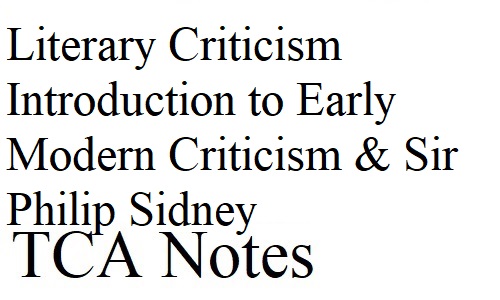Literary Criticism Introduction to Early Modern Criticism & Sir Philip Sidney
To view related topics Click Here.
Introduction to Early Modern Criticism
Even after having journeyed for around fifteen hundred years—or, as a matter of fact, till now—the importance of classics such as Aristotle and Plato is not ignored. Classics remained highly influential to the intellectual world even during the Middle Ages.
The major amount of intellectual exercise was done by clergy and the people of the Church and the major reason was to incorporate classical philosophy and literature with and in Christian teachings.
The Middle Ages also saw the emergence of people, such as Francesco Petrarca (1304-1374), who would become the torch bearer of the secular and educated modern class who would inject classical thought into poetry and literature.
In this way, a new class of bourgeois liberals would grow out of the Christian feudalist society. They worked on a curriculum that focused on a detailed study of both of the classical languages, rhetoric, poetry and moral philosophy.
This particular kind of engagement with the classics—which was different from that of previous Middle Ages thinkers—gave birth to what came to be known as humanism.
The most crucial characteristic of the early modern period is anthropocentrism. A philosophy that puts human at the centre in place of God. This would also be known as Renaissance or Renaissance humanism. It is the genesis of the word ‘modern’.
One has often believed that literary criticism has existed since the time of the classics—which is true—but literary criticism as an independent entity came into being during the early modern period.
First, art was separated from the church and the status of being sacred; secondly, artists became more and more autonomous; thirdly, the invention of the printing press gave rise to wider readership, publication and circulation of the written works; fourthly, the middle class that was gaining power began to assert its opinions against the Church and the feudal system based on humanism; and last but not the least, this age also witnessed a very heavy defence of literature and poetry from the charges of immorality made by the clergy.
Sir Philip Sidney
The challenges to any form of art or literature are persistent in our ages too. When religion was a dominating power, or wherever it is today, literature has always needed to defend itself from the charges related to immorality and blasphemy; in our age, however, the question regarding its utility with regards to social contribution is a common one. Among all the people who have defended poetry, Philip Sydney stands as one of the pioneers.
In his essay, ‘The Defence of Poetry’, Sydney criticizes Plato’s The Republic for banning the poets and claims Poetry to be a better medium of learning than Philosophy. The common charges that literature has been fighting against since centuries are: it’s a leisure activity, it has no function or utility and pointlessness of aesthetics.
With the rise of neo-platonic ideas in the society of medieval times, artists tried to connect poetry to spiritual function. It was Horace that mixed profit and pleasure to defend poetry when he said that “Poets wish either to benefit or to delight or to say things that are both pleasing and apply to life”. Sydney uses the same model to defend poesy.
In 1579, Stephen Gosson, a Puritan minister attacked poetry in The School of Abuse. Sydney rejected the claims made by him and defended poetry by the discussing the questions of the function of poetry, the nature of imitation and concept of nature with the help from literary critics like Aristotle, Horace and Boccaccio.
In the essay, Sydney tells draws on the tradition of poetry and how historically poetry has been used. After commenting that even Plato, who had criticized poetry, used poetry to write, he says: “neither philosopher nor historiographer, could at the first have entered into the gates of popular judgement if they had not taken a great passport of poetry”.
In order to make another argument in defence of poetry, he goes back to the Roman definition of the word poet, where the poet was called vates, which translates as the prophet. On the base of this definition, he argues that Psalms of David are a “divine poem”. In other words, he considers poets to be equivalent of prophets for prophets are also poets; hence, poetry has a divine function.
The ancient Greek word from which the English word, Poet, originates is more important for him. The Greek word translates into ‘to make’, which, for Sydney, has a unique connotation.
Sydney argues when any other creator, say a carpenter, makes something he is bound by the rules of nature. Poet, on the other hand, is not, according to Sydney, is dependent on nature; therefore, his (poet’s) creation is superior to nature.


